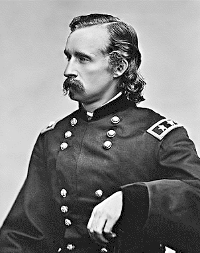On This Date In History
An Inaccurate Trope In Western TV Shows And Movies
October 2, 2024
There is a trope in Western TV shows and movies that appears time and again. It is the trope of the U.S. Army officer who is eager to engage in war with Native Americans. This has appeared often enough that it has likely lead to some viewers believing it to be true. Interestingly, some officers who served in the Old West wrote about how Army officers viewed the prospect of war with Native Americans - and what they wrote might be surprising to some. One such person to write about the matter was General Custer.
General Custer is largely known for his involvement in the Battle of the Little Bighorn. However, he also wrote a number of articles. In one article, he wrote that "I have yet to make the acquaintance of that officer of the army who, in times of peace, desired a war with the Indians" (Custer, 21).
This quote of Custer relates that it was not commonplace for an Army officer to want a war with Native Americans. Custer was not the only officer to write about this matter. It was also written of by General Pope.
While General Pope was the commander of the Department of the Missouri, he wrote: "The first and great interest of the army officer is to preserve peace with the Indians" (Custer, 120). He also wrote that "I repeat, then, that a condition of peace with the Indians is above all things desirable to the military officer stationed in their country" (Custer, 120).
These statements of General Pope depict that it was not typical for Army officers in the Old West to desire war with Native Americans. His statements agree with Custer's statement regarding the matter.
Some may wonder what the reason would be for Army officers in the Old West to be so overwhelmingly against war with Native Americans. General Pope provided information about that as well. He wrote the following about the Army officer that served in the Old West.
"His home during his life is to be at some military post in the Indian country, and aside from the obligations of duty, his own comfort and quiet, and the possibility of escaping arduous and harassing field service against Indians at all seasons of the year, accompanied by frequent changes of station, which render it impossible for him to have his family with him, render a state of peace with Indians the most desirable of all things to him. He therefore omits no proper precautions, and does not fail to use all proper means, by just treatment, honest distribution of annuities, and fair dealing, to secure quiet and friendly relations with the Indian tribes in the neighborhood" (Custer, 120).
These words of General Pope that depict the typical Army officer in the Old West are a far cry from how such officers are sometimes presented on TV and in films. What's more, his statements provide a compelling argument for why Army officers in general had very little interest in warfare with Native American hostiles. He presents war with Native Americans as not being in the personal best interest of the officer. This helps explain why so many officers were not interested in such a thing.
Although Western TV shows and movies tend to portray Army officers as being interested in going to war with Native Americans, this does not seem to be an accurate portrayal. Statements made by both General Custer and General Pope convey that this portrayal is false.
About the Author
Tim Kloos is an online advertising professional. He helps clients with their websites, online presence, and online advertising. If you need help with any of these, feel free to contact him via the contact page.
His tech website is clevelandwebdesignplus.com.
He has also written a children's book set in the Old West.
